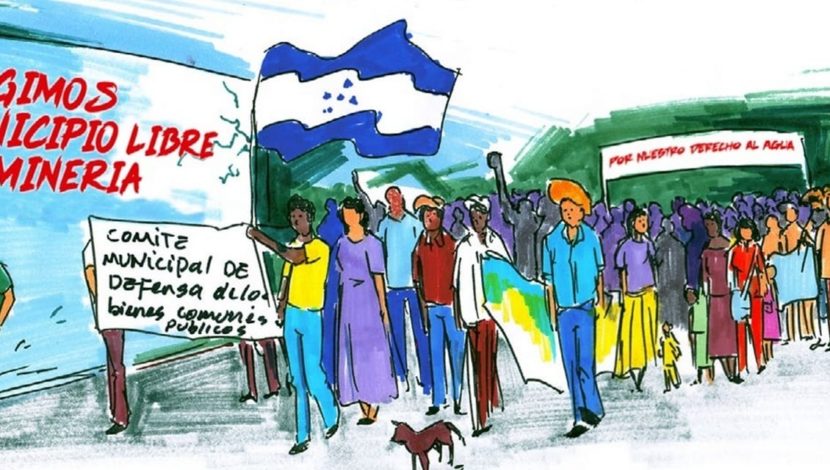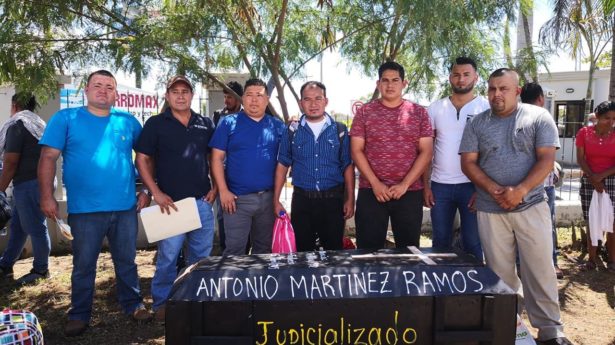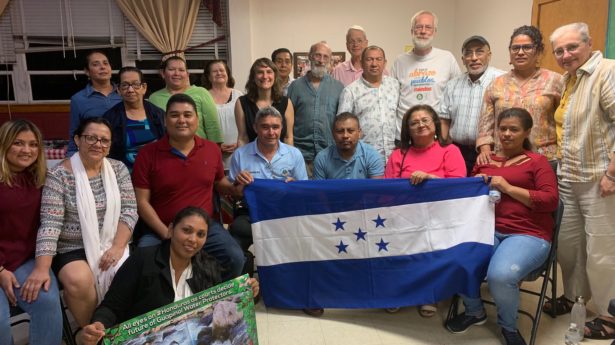The Unitarian Universalist Service Committee advances human rights through grassroots collaborations.
The Escazú Agreement: A Glimpse of Hope for Honduran Environmental Defenders

By on September 23, 2020
Alleviating conditions forcing people from Central America to uproot themselves in search of a better future has been an important focus of UUSC’s work for decades. Environmental destruction led by extractive industries combined with violence and hostilities against communities has become a major driver for migration in the region; new governance instruments are necessary to address these matters with sustainability and justice. The Escazú Agreement has emerged to fill part of the gap in protections for environmental defenders in Latin America.
“Defending Tomorrow,” a July report published by Global Witness, documented that two out of three murders of environmental defenders in 2019 took place in Latin America. Honduras, a priority country for UUSC’s work, holds the chilling record of being the most dangerous place on Earth to protect the environment, with the highest per capita rate of murder for environmental defenders. According to the same report, mining is the business sector involved with the largest number of activists killed globally.
Violence against environmental defenders in Honduras—like the Berta Cáceres murder illustrates—is the result of collusion between a business elite that uses any method at hand to silence opposition to their interests and a state that guarantees impunity for those actions through corruption, tailor-made policy reforms, the capricious use of the courts, and police repression. Since the 2009 coup, successive governments led by the National Party of Honduras have been advancing an agenda favoring the expansion and consolidation of extractive industries—more than a third of the Honduran territory is already leased for mining, electricity, and tourism projects—causing growing conflicts with communities defending their livelihoods and territory.
The Guapinol case is part of the trend of extractivist expansion. Eight environmental defenders have been in pre-trial prison for more than a year in a clear display of political instrumentalization of courts of justice to protect the interests of the mining companies Los Pinares and Ecotek. The Guapinol environmental defenders were awarded the prestigious Letelier Moffitt Human Rights Prize last year, and recently were officially nominated for the Sakharov Prize for Freedom of Thought awarded by the European Union. While their positive role for democracy and the environment is amply acknowledged abroad, in Honduras they have been met with defamation campaigns, criminalization, and constant threats to their safety.
The urgency for recognizing the role of environmental defenders and providing tools for greater transparency, participation, and justice in environmental matters led to the signing of the Escazú Agreement in 2018. This year, Latin American governments should ratify their commitment during the United Nations General Assembly on Saturday, September 26. The Honduran government has not expressed their interest in ratifying the agreement, triggering the formation of the Red Hondureña por Escazú (Honduran Network for Escazú) formed by several key civil society actors, including UUSC’s partner Equipo de Reflexión, Investigación y Comunicación (ERIC SJ), that are advocating for Honduras’ participation in the agreement.
The Escazú Agreement “aims to ensure the right of all persons to have access to information in a timely and appropriate manner, to participate significantly in making the decisions that affect their lives and their environment, and to access justice when those rights have been infringed.”
The agreement follows the tenth principle of the Rio Declaration of 1992:
“Environmental issues are best handled with participation of all concerned citizens, at the relevant level. At the national level, each individual shall have appropriate access to information concerning the environment that is held by public authorities, including information on hazardous materials and activities in their communities, and the opportunity to participate in decision-making processes. States shall facilitate and encourage public awareness and participation by making information widely available. Effective access to judicial and administrative proceedings, including redress and remedy, shall be provided.”
A key innovation of the Escazú Agreement is the introduction of the world’s first set of binding provisions on human rights defenders on environmental matters, seeking the prevention, investigation, and punishment of all attacks against environmental defenders. The ratification of the Escazú Agreement would be an excellent opportunity to expand environmental human rights in Honduras and provide tools for activists to defend themselves at a national and international level.
The anticipated wave of extractivism that will follow the economic crisis caused by the global pandemic should be met with more protections for environmental defenders, instead of additional privileges and impunity for corporations. The Escazú Agreement is an important step in that direction and an international milestone for the shaping and recognition of environmental human rights. The failure of the Honduran government to ratify Escazú would be a sign that they are on the wrong side of history in these matters, while the Guapinol defenders are emerging internationally as an example of courageous environmental leadership.
***
About UUSC: Guided by the belief that all people have inherent worth and dignity, UUSC advances human rights globally by partnering with affected communities who are confronting injustice, mobilizing to challenge oppressive systems, and inspiring and sustaining spiritually grounded activism for justice. We invite you to join us in this journey toward realizing a better future!
Photo Credit: Comité Municipal en Defensa de los Bienes Comunes y Públicos y Comunes de Tocoa

